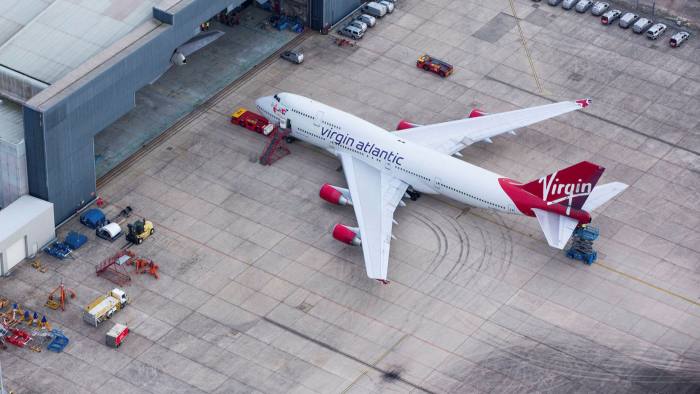Airline to axe up to 3,150 jobs and close London Gatwick operations as it scales back to save business
Virgin Atlantic is preparing to cut almost a third of its 10,000 workforce and close its London Gatwick operations as the airline scales back to survive the coronavirus crisis.
The British airline on Tuesday warned it would take up to three years to return to 2019 traffic levels and announced plans to cut up to 3,150 jobs. Its plan to reshape the business comes after a turbulent week for the aviation industry, with thousands of planned job cuts at British Airways, Ryanair, Scandinavian airline SAS and aerospace manufacturer Rolls-Royce.
Virgin Atlantic will exit Gatwick airport, where it has been based for the past 35 years, and move leisure flying to London Heathrow as well as keeping its base at Manchester airport.
The move will come as a further blow to the airport after BA signalled it could also bear the brunt of its own job cuts amid warnings its Gatwick operation may not return following the coronavirus crisis. In an internal post to staff, seen by the Financial Times, Shai Weiss, chief executive at Virgin Atlantic, warned current cost measures and support packages were “not enough”.
“If we are to safeguard our future and emerge from this crisis a sustainably profitable business, now is the time for further decisive action to reduce our costs and preserve cash,” he wrote. Virgin Group, which owns 51 per cent of Virgin Atlantic, is racing to find new investors within the next month as the airline fights for its survival. It has also been in talks with the UK government for the past month over a £500m bailout of commercial loans and guarantees.
However, its initial plan was rejected last month after the government was left unimpressed by its failure to seek investment elsewhere. It continues to be in “constructive” talks with the government. “It has been clear throughout that any potential investor, including HM Government, expects us to have taken all possible self-help measures as a precondition to funding,” wrote Mr Weiss.
In the past few days, airline groups and aerospace manufacturers have grown increasingly pessimistic over recovery. Last week, British Airways revealed plans to cut almost 30 per cent of its 42,000-strong workforce, while Ryanair said it would axe up to 15 per cent. SAS, the Scandinavian airline, said it would permanently cut half — 5,000 — of its staff. Like BA and Ryanair, Virgin Atlantic has also furloughed staff through the government’s Covid-19 job retention scheme.
Rolls-Royce announced plans for up to 8,000 job cuts. Virgin Atlantic plans to retain its slots at Gatwick airport by leasing them out to other airlines, giving it the option to return when the aviation market returns to normal. Gatwick airport was “saddened” by the news but said it would work with Virgin Atlantic to look at restarting operations when demand returned.
“We remain very optimistic about the long-term prospects of Gatwick airport and our resilience as a business, and having remained open throughout this pandemic we are in a strong position to extend our current operations quickly to meet demand,” it said. It will also cut the number of aircraft types it flies as part of its latest cost-cutting measures. It will no longer use its seven 747-400s, and plans to retire its four A330-200 aircraft in early 2022.
This will see it reduce its 43-strong fleet to 36, and leave just three — more efficient and environmentally friendly — plane types: A350, B787 and A330-300s.
Separately, it plans to rebrand Virgin Holidays as Virgin Atlantic Holidays and also plans to close about 15 per cent of its branded stores in 2020. It intends to focus instead on its partnership with Next, the retailer, and online selling. Brian Strutton, general secretary at Balpa, the British pilot union, hit out at the government for “sitting on its hands while aviation plunges further towards a death spiral”.
The union wants the government to call a moratorium on job losses in aviation. Virgin Atlantic has long struggled with profitability, reporting losses for the past two years. However, the airline was expecting to return to profit by the end of 2020, one year earlier than it had originally planned. “We have weathered many storms since starting up almost 36 years ago. None has been as devastating as this terrible pandemic and the associated loss of life and livelihood for so many around the world and the UK,” wrote Mr Weiss.
Source: Financial Times





